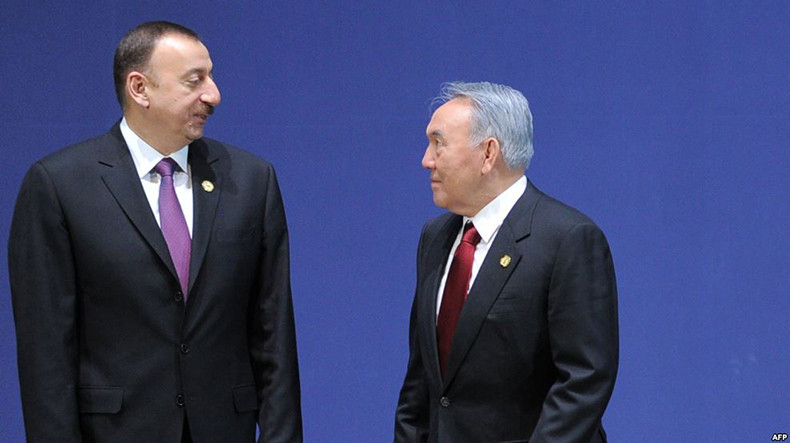
Aliyev’s demarche against Nazarbayev may yield to unpredictable consequences for Baku
The tightly state-controlled mass media in Azerbaijan have unleashed a new propaganda campaign these days. This time the target is a long-time ally Kazakhstan and its President Nursultan Nazarbayev.
The press secretary of Kazakh President made a statement few days ago citing the medical condition of President Nazarbayev (which is a state secret in Kazakhstan, according to law) and that due to a treatment he would be receiving throughout the week he might not be able to travel to Armenia (for CSTO summit) and Azerbaijan (bilateral agenda), as had been scheduled.
This last-minute cancellation infuriated Azerbaijani dictator Ilham Aliyev who is used to talking to foreign leaders and politicians from the position of blackmails and ultimatums. Kazakhstan has traditionally been considered an ally of Azerbaijan in international scene.
Being a member of the same military alliance - Collective Security Treaty Organisations, or CSTO – together with Armenia, Kazakhstan has not only failed to adopt at least a balanced position with regards to Nagorno Karabakh, but a bluntly one-sided stance for years, perhaps preferring a show of solidarity with Azerbaijan within the the Cooperation Council of Turkic Speaking States, or the Turkic Council, established as a brain-child of Turkish President Recep Tayyip Erdogan. It’s fitting to recall not only, or not as much the notorious and controversial letter dispatched by Ilham Aliyev and read by Nursultan Nazarbayev on May 29, 2014, at the Eurasian Economic Union summit in Astana (Aliyev thanked him on record at their follow-up meeting), but the fact that Nazarbayev deliberately sided with Azerbaijan during the last April’s military aggression against the people of Nagorno Karabakh and the Four Day War, which disrupted any possibility for adopting common position on the matter within the CSTO.
Now, Aliyev not only publicly shows deep bitterness or indignation at his senior partner Nazarbayev due to this last-minute cancellation of scheduled trip to Baku (possibly void of any tangible agenda), but also orders all the media outlets under his tight control to start publishing longreads criticising and mocking Nazarbayev and his country for all sorts of things.
One of those articles is about one of the most sensitive issues for Nazarbayev – the Kashagan oilfield and the problems related to the start of production at this offshore oil field.
The international consortium for the implementation of this giant project has been undergoing numerous transformations in the last 16 years, whereas the international media has continuously pointed at the general ambiance of disbelief in reliability and profitability of this giant project.
Many leading experts have even expressed doubts that there are any oil reserves in the field. October 23 was marked as another confirmed date for the start of production at the Kashagan offshore oil field. Soon after confirming the date in the last week of September, Kazakhstan's Energy Ministry quickly withdrew the statement and postponed the start for uncertain period.
According to most conservative estimates, Nazarbayev has already spent around $50bln on this project, yet the start of production or end of expenditures are not in the horizon.
The public indignation of Aliyev this time may yield not the usual results (such as a public and official explanations from Astana), but the opposite – losing a staunch ally.
Clearly, the high level of oil prices in the international market allowed Aliyev to adopt a certain stubborn and “stiff-necked” behaviour in his affairs with foreign leaders, international organisations and other politicians and create a situation when the partners should have gone out of their way to please and comfort Ilham Aliyev.
Tinkering with the constitution is in vogue in the FSU, as Azerbaijan's strongman strengthens his position. Why? https://t.co/cEP4IEo9Jj pic.twitter.com/eJnuDMgjDK
— Jack Farchy (@jfarchy) October 3, 2016
Back then, the explanations and recommendations of Armenia to foreign leaders that Aliyev had simply been making up a Cold War era style “game theory” behaviour would go in vain, for a number of reasons. In domestic affairs Aliyev would orchestrate suppressions and silence his opponents, invest billions in military procurement to raise price of not instigating instability in the region for both Armenia, Nagorno Karabakh and foreign stakeholders, as well as demand loyalty in international scene from everyone in exchange of keeping these threats on a moderate scale.
Azerbaijan leader enters uncharted territory as oil boom ends
— Eddie Du (@Edourdoo) January 26, 2016
By Jack Farchy in Moscow https://t.co/ysX1ahQfVY
Yet this same policy and Aliyev’s old-good posture at times of low oil prices in international markets, shrinking export capabilities and declining economy in Azerbaijan points at a certain panic and anxiety in dictator’s mind. For example, at a government meeting on October 8, Aliyev showed a rare example of honesty and told his cabinet members that “behind closed doors he is being coerced to recognise the independence of Nagorno Karabakh”, something that he otherwise would even deny to be part of ongoing negotiations.
#Azerbaijan acc rejects basicprinciples proposed by #OSCE MGCC countries 4peaceful stlment of #NagornoKarabakh issue https://t.co/DtVSU69sMY
— Shavarsh Kocharyan (@Sh_Kocharyan) October 8, 2016
Since the beginning of 2016 a number of leading regional experts, Thomas de Waal, Jack Farchy of Financial Times, and others began portraying Azerbaijan as a state that was entering a period of instability, unpredictability and crisis.
It’s obvious that by now a routine posture of Ilham Aliyev is no more having same success in international arena, and this recent demarche against a staunch ally Kazakhstan and its President Nursultan Nazarbayev may have adverse consequences for Aliyev, including in terms of his domestic stability.
Author – Asadour Sargsyan
Newsfeed
Videos






























